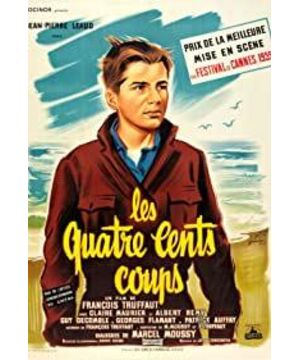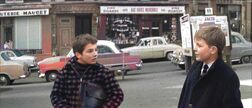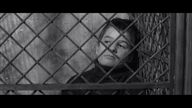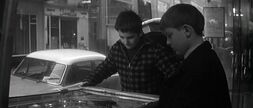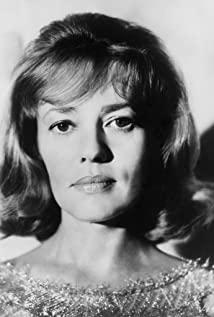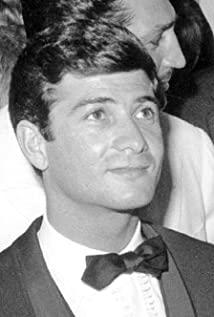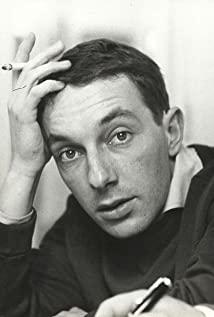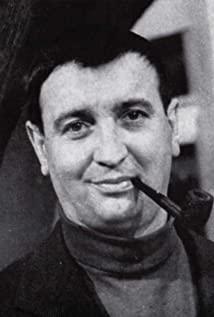at the Fan Yinghui On the afternoon of October 5, 2016, I hosted the screening and post-screening exchange of the Blu-ray version of "Four Hundred Strikes" at the Fan Yinghui. The superb audio-visual equipment in the Mianyinghui Theater made this screening very successful, and it can be regarded as fulfilling my dream of "watching "Four Hundred Strikes" on the big screen in my lifetime.
Not many members and audiences came to participate in the screening, there were only 9 people in total, but the effect and atmosphere of the post-screening exchanges were very good. It is particularly worth mentioning that Nicholas, son of Robert Bober, one of the associate directors of "Four Hundred Strikes", and his Chinese wife attended the event and told some very precious behind-the-scenes stories.
The following is a memo I compiled based on the post-screening exchanges that day, and I keep it here.
1. Paris/Old City
Truffau grew up in Paris, and the story of "Four Hundred Strikes" also took place in Paris.
Paris nourishes Truffaut, and Truffaut loves Paris. Therefore, the first shot of the film, and it is a long shot, is dedicated to Paris.
There are a lot of street scenes in Paris, the street scenes of the old city of Paris. More than half a century later, these street scenes are still faintly visible in Paris. Regarding Paris, "Four Hundred Strikes" is a film that can be compared with "Paris Belongs to Us" (1961), "A Beautiful May" (1963) and other films, and it is also a film that can be compared with "Love at Sunset" ( 2004), "Paris, I Love You" (2006), "Midnight in Paris" (2011) and other films compared.
2. The
"Four Hundred Strikes" is an autobiographical film by Truffaut.
Truffaut was born in 1932, and his rebellious youth was mainly in the years before and after the end of World War II. The story of "Four Hundred Strikes" took place in the 1950s, which is the era when the film was shot.
Why is there such a dislocation? I personally think there are two main reasons. One is the production cost. The story took place in the 1950s and everything is ready-made. Real-time shooting is enough to save money and trouble. The second is to put a little distance from the director’s own experience. Although the film is "Autobiographical film" is not a scene reappearance, let alone a documentary, but a real feature film!
3. André Bazin
’s line of words "dedicated to André Bazin" in the opening title of the movie has already explained the weight of André Bazin in Truffaut's heart.
André Bazin is Truffau’s benefactor and his spiritual father.
When Truffau left the juvenile office, André Bazin was one of his guarantors. After that, Andre Bazin helped him find a job, helped him enter the literary circle, and became an important driving force for him to become a famous film critic.
André Bazin lived only 40 years old and died in 1958, on the eve of the outbreak of the "New Wave of French Cinema". Although he did not participate in the "New Wave of French Cinema", André Bazin is undoubtedly the spiritual mentor of the "Cinema Manual" (the main force of the "New Wave of French Cinema").
4. Jean-Pierre Leold
In May 2016, 72-year-old Jean-Pierre Leold won the "Palma de la Palme of Honor" at the 69th Cannes Film Festival.
Throughout Jean-Pierre Leord’s acting career, his most remembered role by fans is definitely Antoine, from the "Antoine's Adventures" series, including "Four Hundred Strikes" (1959) and " Antoine and Camelot" (1962), "Stealing a Kiss" (1968), "Marriage Life" (1970), and "Love Running" (1979). These five films are closely related to Truffaut's own experience, and can also be regarded as Truffaut's "autobiographical series".
That day, I said that Leold had no other important performances except the "Antoine's Adventures" series. The French friend Nicolas did not express anything on the spot, but afterwards sent me other important performances of Leod, who was not directed by Truffaut in his mind: "Le Havre" (2011), "Sentimental Paying" "One Charm" (1996), "Misted Tribulation" (1996), "The Diary of the Seducer" (1996), "The Birth of Love" (1993), "Life in Bohemia" (1992), "I Hired a Professional Assassin" "(1990). Friends who like Leoard may wish to look for these videos.
5. Film language is
different from some great movies. "Four Hundred Strikes" is not a work with a major breakthrough in film language.
However, the film language of "Four Hundred Strikes" is mature, unlike some directors' feature film debuts that are slightly rigid in this regard.
In fact, before "Four Hundred Strikes", Truffaut had directed short films and participated in the production of other films, accumulating a certain amount of shooting experience. Although "Four Hundred Strikes" has no major breakthroughs in the language of the film, there are also no obvious mistakes.
long shoot.
The most famous long shots in the film are undoubtedly the empty shots at the beginning and the long shots of Antoine running at the end.
In addition to telling the audience "This is Paris", the long shot at the beginning also sets the tone of the film's gloomy and gloomy tone. Judging from the light, this is Paris in winter. Although there is sunshine, it is not brilliant, and it is not even bright.
If the director wants to express the darkness and depression of the environment, shooting in winter is often a good choice. The director Yang Chao deliberately chose to shoot the "Yangtze River Map" recently released in winter.
A set of long shots at the end of Antoine's running has become a classic long shot of running in film history. This group of long shots is impeccable in terms of appeal and meaning (breaking free from imprisonment, running to freedom).
Pan the camera.
There are a lot of pans in the film, most of the time it is to express a kind of contrast.
For example, when Antoine was locked in a police station, there was a scene where two policemen were playing chess in a leisurely manner, and then Antoine was locked in a trumpet.
Move the lens vertically.
For example, when Antoine went to the cinema for the first time playing truant from school, the camera suddenly moved up, and the sign of "Cinema" was striking. Truffau was afraid that others would not know how much Antoine or himself loved movies.
Another example is when Antoine and his brother in need sat in chairs to discuss the "problem" when they were in the juvenile management office. After the dialogue was over, the camera did not stop immediately, but moved up, allowing the audience to see the angel sculpture on top of their heads (?) , Is this contrast, or irony?
All in all, if you pull the film, the movie language of "Four Hundred Strikes" is also remarkable. As a feature film debut, this is already commendable.
6. Movie fans/movie obsessed/fascinated
"Movie fan" is a common name in mainland China, "shadow" is a common name in Hong Kong and Taiwan, and the term "fanying" was coined by mainland film scholar Li Yang. My personal opinion is that "movie fan" refers to ordinary movie fans, "movie obsessed" refers to high-end movie fans, and "movie fan" is a verb, which is the behavior of "movie fan", and "movie fan" is approximately equal to " Shadow Fool".
Truffaut is of course a "shadow idiot" and a high-level "shadow idiot".
In "Four Hundred Strikes", the general audience often sees only the confusion and struggle of the problem teenagers, and may not be able to see the high-level "shadow obsessed" Antoine. In fact, behind the confusion and struggle, both the origin and the death are inseparable from Truffau's identity as "shadow madness".
In reality, Truffau and his best friend (Rene, who played truant with him in the film), once organized a fan club, but the management was poor and the debt was high. This was the main incentive for him to steal the typewriter and other thefts, not the film. In that way, just to make some money.
In the film, Truffaut did not deliberately advertise his identity as a "shadow obsession", but from many details, we can still see Truffaut's "fascination" complex.
6.1 Playing truant for the first time, went to the movies, and gave a close-up of the sign of "Cinema"!
6.2 The only happy thing about being with my parents is going to the movies together. Moreover, Antoine likes the movie "Paris Belongs to Us" very much, and his adoptive father finds it boring. This is naked contempt. !
6.3 When hiding in a good friend's house, I finally waited until I was able to get out. Antoine said: "I want to miss newsreels." I love the house and Wu, and I love movies so much that I don't even want to miss newsreels. (Imagine today, what kind of experience is it like to have a movie fanatic friend who doesn't even want to miss a post ad?)
6.4 Steal a poster in a movie theater.
6.5 When Antoine's mother met the director of the juvenile management office, she talked about her son and said that he didn't like sports, so he liked watching movies.
...It's
full of love, but it's hidden deep.
PS: "Paris Belongs to Us" is a work directed by Trevor's friend Levitt. When "Four Hundred Strikes" was released, "Paris Belongs to Us" hadn't been released yet. Therefore, Truffau actually gave his friend a big "soft".
7. Bookworm
fans and bookworms are often not separated, and many fans also like to read books. Many movie fans like to read books first, then movies, such as André Bazin, Truffaut, and me.
Truffaut's grandfather and grandmother were born into a down-and-out noble family, and there were books in the family, and there was also an atmosphere of reading. Before his grandmother's death, Truffaut grew up mainly in his grandfather's house, where he learned and fell in love with reading.
In reality, Truffau loves books as much as he loves movies. When he was a teenager, he already had about 200 books. It should be noted that in that era, books were very expensive.
In the film, there are also several details that show the daily life of the bookworm Antoine.
7.1 Balzac! Balzac! Antoine was able to recite the classic passages in Balzac's works, but unfortunately he was charged with plagiarism. Antoine nearly burned the house in memory of Balzac. Although Balzac did not bring him good luck, but he was obsessed with it-writers such as Balzac and Proust were Truffau's lifelong beloved.
7.2 When Antoine and his best friend Rene were "spraying darts" in the attic, Antoine still had a book on his hand. What kind of compelling is this!
7.3 When Antoine "confessed" at the juvenile management office, he talked about a past incident. He stole 10,000 francs from his grandmother, and the grandmother gave him a book. However, the money was confiscated by his mother and the book was also confiscated. Mom reselled it! Love the book and never forget to black your own mother, the real bookworm is righteous to exterminate relatives!
8. In the savage growth
movie, we watched an Antoine who grew savagely. This is of course the experience of savage growth from Truffaut. But if this were all, Truffaut would not be Truffaut.
From the biography of Truffaut, Truffaut's name is Truffaut, which is a relatively personal growth and a special case. I am afraid it is difficult to find a case similar to him at the time. The growth of Antoine in "Four Hundred Strikes" is by no means an isolated case. He became a troubled teenager, the result of the joint efforts of family, school, and society. It can be said that in order to throw the problem to the society, Truffaut blocked some of his own personal experience in "Four Hundred Strikes", thereby weakening Antoine's identity as a "shadow idiot" and a "bookworm".
In order to strengthen the image of Antoine's "barbaric growth", Truffaut vilified Antoine's parents in the film to some extent. Truffer’s parents do have a lot in common with Antoine’s parents. Their unmarried mother and adoptive father are identical in identity; they love sports. The middle adoptive father likes racing, and the adoptive parents also like to go hiking during holidays), and they have the same hobbies; mothers love freedom and beauty, and think that their sons are cumbersome and consistent; adoptive fathers and sons get along better than mothers and children, and they are the same. . Even, the layout of the house where they live, the holiday sending his son to summer camp, the son lied that his mother was dead, and the son wrote to the adoptive father to tell his heart, these details are highly consistent with the reality of the movie.
However, Truffaut's parents were not as embarrassed as Antoine's parents in the film. Antoine’s parents were obviously not well-educated, especially his adoptive father, who was a big boss, while Truffaut’s parents’ education level was not low at that time. In addition to climbing, they also liked reading and Watching movies, these all have a positive impact on Truffaut. If Truffau was born entirely in a laboring family, his possibility of becoming a filmmaker would be greatly reduced. Truffau was heavily indebted by the fan club, and his adoptive father helped him repay a lot of debts. For this reason, he has repeatedly postponed the journey of conquering Kilimanjaro Snow Mountain, and the sacrifice is not a big deal. In the film, Antoine's adoptive father sent him to the juvenile office just because he had stolen the typewriter.
Truffaut had a poor relationship with his parents throughout his life, but he vilified his parents in the film, perhaps not only because of the resentment in his heart, but also because of the need for the film's theme and film narrative.
Chabrol, Trevor’s comrade-in-arms in the "Cinema Manual", said that he did not have the "interesting" experience of Trevor, so he could not make a movie as "interesting" as directed by Trevor (to the effect).
As a director, Truffau's "interesting" experience did provide him with rich film material, but as a child, these unfortunate experiences also left him a psychological shadow. You can say that suffering is a wealth, but if you can choose again, I don't think Truffaut wants this wealth.
In the post-screening exchange, an audience member said that in an era, such painful growth can create great artists and allow them to retain precious works. Therefore, "painful growth" is not necessarily a thing for human society. Bad things (to the effect, maybe inaccurate). I think that even a diversified society with overall health and prosperity cannot prevent some children from being "suffered", but if the proportion of "suffering" children reaches a certain level, it means that the whole society is not good. For an individual, even if his "suffering" contributes a valuable sample of experience to mankind, it cannot change the fact of his "suffering".
9. The children are very good. When
Lee Ang talked about "Fantasy Drifting of the Junior School", he once said that "water, animals and children" are the three major problems for the director. Most of the actors in "Four Hundred Strikes" are children, which is a big problem in making the film.
However, this big problem has been perfectly solved, Jean-Pierre Leod’s performance is flawless, and all of his classmates behave truthfully and naturally. There is a scene in the film where Antoine and René are mixed into the puppet show. The group of children in the theater are all innocent, cute and expressive (you can make an emoticon pack if you pull it out) )-Of course, these children’s "performances" are likely to come from live snapshots.
The children are very nice!
It is very important for Truffaut to guide and tune properly, and the intervention of associate director Robert Bober is even more important.
According to French friend Nicolas, his father Robert Bober was not engaged in film work at first, but engaged in psychological intervention work for children after the war. He knew Truffaut by chance, and Truffaut learned about his work. Before Truffau started filming "Four Hundred Strikes", considering that most of the actors in the film were children, it was important to find a staff member who was familiar with children to take care of them, so he invited Robert Bober. Robert Bober was only responsible for taking care of these little actors at the beginning. As the shooting progressed, he also liked "making movies" and became an assistant director. Later, Robert Bober also served as the assistant director of many Truffau films, including "Wild Child" (1970) and "Pocket Money" (1976), which also feature children as the protagonist.
10. The upside-down world
Antoine and Rene played truant for the first time. In addition to watching movies, Antoine also went to play spinning machines.
Under the centrifugal force, Antoine was "free", happy, and could turn his body upside down. After turning it upside down, Antoine saw the upside-down world.
This is the actual situation during the game, but it is also a "metaphor" that Truffaut came up with at his fingertips.
11. Stealing a bottle of milk
Antoine's story of stealing milk has become a classic in film history and has been tributed by many directors.
Truffau filmed the scene with static braking. For the first time, Antoine tentatively tried, and then walked away, but his shadow remained in the picture. Sure enough, he came back and took a bottle. After all, it was the first time to steal, the kind of anxiety and anxiety, in the fixed lens, the audience not only saw, but also seemed to hear his heartbeat.
Hunger and insecurity are the material and spiritual dilemmas of a runaway teenager.
After that, he drank milk. At first, the hole was too small to drink much, so he poke the hole big with his finger and drank it roundly. That kind of panic, that kind of eagerness, do you know the taste of Sao Nian?
12.
Nicholas, a sensitive person, said that Truffau became more sensitive because of his unfortunate growth experience, and he was very careful and polite in dealing with people and things, and deliberately kept his distance to avoid being hurt.
In Truffaut's life, there were not many close friends who could get along with him more casually. Although Robert Bober has participated in many of Truffaut's works, Truffaut always uses honorifics when interacting with him. Outside of work, the two do not have much personal contact.
Truffau and Godard used to be good friends and fell out after the 68th storm. Later, Godard showed his kindness to him, but Truffaut did not appreciate it and did not interact with him until his death. Jean Genet (the author of "The Diary of a Thief") was once the "literary father" of Truffaut. Later, Jean Genet was heartbroken because of Truffaut's failure to make a letter and condemned Truffet. Truffet replied and apologized , But because of this, they broke off friendship.
Truffau is strong, but at the same time has a fragile glass heart.
13. Correction In the
post-screening exchange on October 5, I once said that the illegitimate son Truffau did not know who his biological father was for the rest of his life. I remembered this wrong.
Truffau found his biological father when he was in his thirties. He also planned to see his biological father, but in the end, he just looked at his biological father's residence from a distance and did not recognize him.
This incident once again confirmed that Truffaut was a "sensitive person" in capitals.
Made on 2016.10.13, changed on 2016.11.10
View more about The 400 Blows reviews


